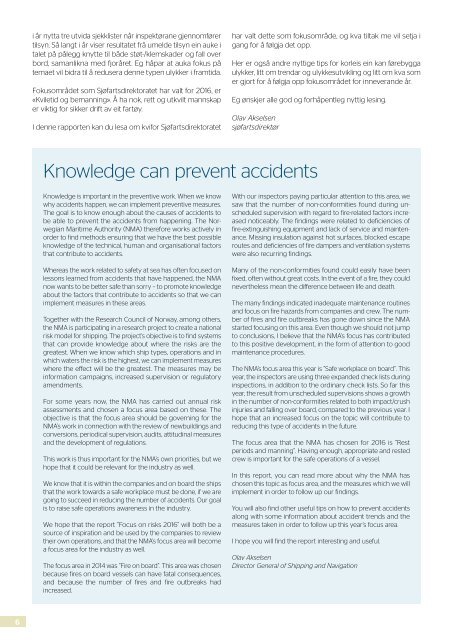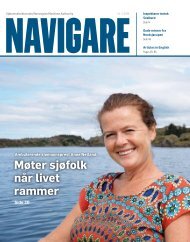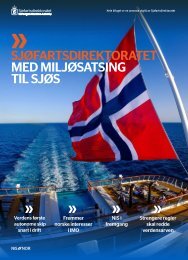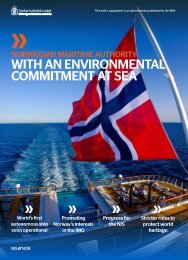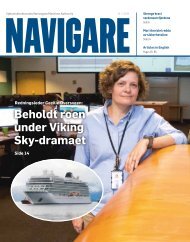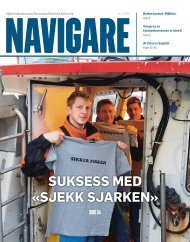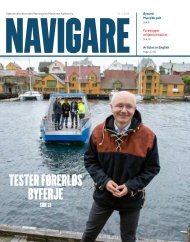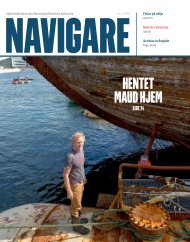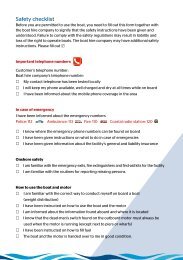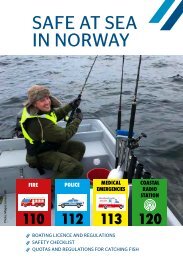Fokus på risiko 2016
Sjøfartsdirektoratets årlige risikorapport som redegjør for risikosituasjonen i skipssikkerhetssammenheng.
Sjøfartsdirektoratets årlige risikorapport som redegjør for risikosituasjonen i skipssikkerhetssammenheng.
- No tags were found...
You also want an ePaper? Increase the reach of your titles
YUMPU automatically turns print PDFs into web optimized ePapers that Google loves.
i år nytta tre utvida sjekklister når inspektørane gjennomfører<br />
tilsyn. Så langt i år viser resultatet frå umelde tilsyn ein auke i<br />
talet på pålegg knytte til både støt-/klemskader og fall over<br />
bord, samanlikna med fjoråret. Eg håpar at auka fokus på<br />
temaet vil bidra til å redusera denne typen ulykker i framtida.<br />
<strong>Fokus</strong>området som Sjøfartsdirektoratet har valt for <strong>2016</strong>, er<br />
«Kviletid og bemanning». Å ha nok, rett og utkvilt mannskap<br />
er viktig for sikker drift av eit fartøy.<br />
I denne rapporten kan du lesa om kvifor Sjøfartsdirektoratet<br />
har valt dette som fokusområde, og kva tiltak me vil setja i<br />
gang for å følgja det opp.<br />
Her er også andre nyttige tips for korleis ein kan førebygga<br />
ulykker, litt om trendar og ulykkesutvikling og litt om kva som<br />
er gjort for å følgja opp fokusområdet for inneverande år.<br />
Eg ønskjer alle god og forhåpentleg nyttig lesing.<br />
Olav Akselsen<br />
sjøfartsdirektør<br />
Knowledge can prevent accidents<br />
Knowledge is important in the preventive work. When we know<br />
why accidents happen, we can implement preventive measures.<br />
The goal is to know enough about the causes of accidents to<br />
be able to prevent the accidents from happening. The Norwegian<br />
Maritime Authority (NMA) therefore works actively in<br />
order to find methods ensuring that we have the best possible<br />
knowledge of the technical, human and organisational factors<br />
that contribute to accidents.<br />
Whereas the work related to safety at sea has often focused on<br />
lessons learned from accidents that have happened, the NMA<br />
now wants to be better safe than sorry – to promote knowledge<br />
about the factors that contribute to accidents so that we can<br />
implement measures in these areas.<br />
Together with the Research Council of Norway, among others,<br />
the NMA is participating in a research project to create a national<br />
risk model for shipping. The project’s objective is to find systems<br />
that can provide knowledge about where the risks are the<br />
greatest. When we know which ship types, operations and in<br />
which waters the risk is the highest, we can implement measures<br />
where the effect will be the greatest. The measures may be<br />
infor mation campaigns, increased supervision or regulatory<br />
amendments.<br />
For some years now, the NMA has carried out annual risk<br />
assessments and chosen a focus area based on these. The<br />
objective is that the focus area should be governing for the<br />
NMA’s work in connection with the review of newbuildings and<br />
conversions, periodical supervision, audits, attitudinal measures<br />
and the development of regulations.<br />
This work is thus important for the NMA’s own priorities, but we<br />
hope that it could be relevant for the industry as well.<br />
We know that it is within the companies and on board the ships<br />
that the work towards a safe workplace must be done, if we are<br />
going to succeed in reducing the number of accidents. Our goal<br />
is to raise safe operations awareness in the industry.<br />
We hope that the report ”Focus on risks <strong>2016</strong>” will both be a<br />
source of inspiration and be used by the companies to review<br />
their own operations, and that the NMA’s focus area will become<br />
a focus area for the industry as well.<br />
The focus area in 2014 was ”Fire on board”. This area was chosen<br />
because fires on board vessels can have fatal consequences,<br />
and because the number of fires and fire outbreaks had<br />
increased.<br />
With our inspectors paying particular attention to this area, we<br />
saw that the number of non-conformities found during unscheduled<br />
supervision with regard to fire-related factors increased<br />
noticeably. The findings were related to deficiencies of<br />
fire-extinguishing equipment and lack of service and maintenance.<br />
Missing insulation against hot surfaces, blocked escape<br />
routes and deficiencies of fire dampers and ventilation systems<br />
were also recurring findings.<br />
Many of the non-conformities found could easily have been<br />
fixed, often without great costs. In the event of a fire, they could<br />
nevertheless mean the difference between life and death.<br />
The many findings indicated inadequate maintenance routines<br />
and focus on fire hazards from companies and crew. The number<br />
of fires and fire outbreaks has gone down since the NMA<br />
started focusing on this area. Even though we should not jump<br />
to conclusions, I believe that the NMA’s focus has contributed<br />
to this positive development, in the form of attention to good<br />
maintenance procedures.<br />
The NMA’s focus area this year is ”Safe workplace on board”. This<br />
year, the inspectors are using three expanded check lists during<br />
inspections, in addition to the ordinary check lists. So far this<br />
year, the result from unscheduled supervisions shows a growth<br />
in the number of non-conformities related to both impact/crush<br />
injuries and falling over board, compared to the previous year. I<br />
hope that an increased focus on the topic will contribute to<br />
reducing this type of accidents in the future.<br />
The focus area that the NMA has chosen for <strong>2016</strong> is ”Rest<br />
periods and manning”. Having enough, appropriate and rested<br />
crew is important for the safe operations of a vessel.<br />
In this report, you can read more about why the NMA has<br />
chosen this topic as focus area, and the measures which we will<br />
implement in order to follow up our findings.<br />
You will also find other useful tips on how to prevent accidents<br />
along with some information about accident trends and the<br />
measures taken in order to follow up this year’s focus area.<br />
I hope you will find the report interesting and useful.<br />
Olav Akselsen<br />
Director General of Shipping and Navigation<br />
6


